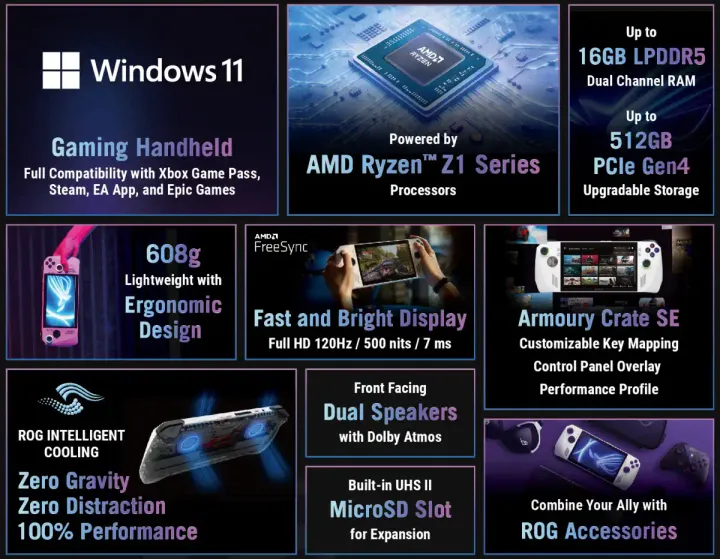ROG Ally launching May 11th, but I'm still skeptical
I'll admit it: the hype for the Ally is almost getting to me. But it's still DOA as far as I'm concerned due to these three critical failures...

ASUS has announced the launch day of the Ally: Thursday, May 11th at 10 AM Eastern! This is some impressive turnaround for a device announced on April fools day. 40 days. We still don’t have an official price, but we do have a launch day event featuring keynote speaker Shawn Yen, product management director at ASUS, who will also be a panelist alongside Roanne Sones, senior vice president of Xbox Hardware and Frank Azor, the Chief Architect of Gaming Solutions at AMD.
The panel is titled “The Future of Gaming Is Handheld” and it’s moderated by ROG Pulse host Jake Kulinski.

I’m curious just what Xbox has to do with any of this. Will Microsoft be announcing Windows Series X: an Xbox-flavored Windows build specifically for handhelds? Will Microsoft be subsidizing the cost of hardware in order to undermine the Steam Deck? Only time will tell. Either way I’m excited to watch not only this panel, but also how Valve responds.
Lacking from this announcement, though, is the official price point. All we've got are rumors and leaks. Now, this comes from Twitter user snoopytech_ who has a decent track record when it comes to these leaks.
While official reports have placed the price of the Ally “well under $1,000,” Snoopy’s leaks have put a real number on things: $599 for the Z1-powered base model and 256 GB of internal storage.
In the same vein, there have been reports of a leaked Best Buy product page detailing a $699 price tag for the Z1 Extreme and 512 GBs of storage.
ASUS ROG Ally (AMD Z1 Extreme) = $699.99 https://t.co/GDkz6wZNWI
— SnoopyTech (@_snoopytech_) April 26, 2023
These seem like impossibly low price points for ASUS to pull off on their own.
The question is: how? After all, we know for a fact that Valve is losing money on the 64 GB Steam Deck. And we believe the same is true for the 256 GB model if they’re not just breaking even. The reason they can do that, though, is because they own the default storefront and make money from every game sold. So game sales subsidize the cost on the Steam Deck just like they do on console.
But ASUS doesn’t have a stake in Windows, Valve, or Epic… and they don’t make money off every game sold. That means that, unlike Valve, ASUS needs to make a profit from every unit sold because they can’t expect to make up for it later with game sales.
Enter Microsoft. As my friend Jackson and I discussed on our podcast Press Steam to Start, if AMD’s Z1 announcement might offer a clue. It mentions PC Game Pass and it could be that money-bag Microsoft might be footing some of the bill here.
Not only that, though… as I reported in Friday’s Deck News, we’ve seen photos circulating of a newly re-designed Steam Deck cooler and main board. In the breakdown, I noted the significantly smaller heatpipe on the new design and that got me thinking: what if this is a cost-cutting re-design to enable a lower price for the Steam Deck?
It would be smart for Valve to lower the price of each model, especially to compete with the likes of the Ally.
What if Valve dropped the 64 gig model to $350, the 256 to $450, and the 512 to $550. They could afford it and keep the Deck competitive.
And while many outlets use clickbait-y titles like “look out Steam Deck, the Ally’s only $699,” I am still highly skeptical it will be a true Deck competitor.
Look, I’ll admit it, a majority of my skepticism of the Ally my belief ASUS couldn't compete with the price of the Steam Deck. But that wasn't all of it. There are still three other major factors that render the Ally dead on arrival, at least for me.
#1 Controls & Ergonomics
Judging from the renders we’ve seen, I have serious concerns about how the Ally will feel in the hand. I don’t understand why so many devices try to be flat. The 3DS, the Switch, the AYANEO and GPD devices… they don’t have grips.
The Ally tries to split the difference and offers some grip, but I’m worried that it’s not going to be enough. The Deck is designed perfectly to fit in my hand. It offers a superb ergonomic experience, at least for me.
I’m worried that the Ally is not going to provide that same level of comfort. Especially with the offset, Xbox-style thumbstick layout.
Furthermore, the lack of any trackpads is a non-starter for me. The trackpads are a critical aspect of gaming on a handheld. I’ve grown accustomed to configuring each pad to act as virtual menus or as a mouse. There’s infinite customization that simply won’t exist on the Ally.
It's also missing gyro control and that d-pad looks like an abomination straight from the depths of hell.
#2 Battery Life
The Ally has a 1080p, 144 hz screen and reportedly double the performance of the Steam Deck. That all sounds great until you realize that it only offers a 40 minute battery life. To be fair, I don’t take my Steam Deck out into public and play. I use my Deck on the sofa where I have a power source readily available. And if that’s how most people will play their Ally, then this might not be an issue. But I don’t keep my Deck charging 24/7.
So how will the Ally fare? I’m guessing that if you don’t mind compromising on all the aforementioned metrics then you’ll have a comparable experience. But the “bigger number better” crowd–the folks who’ll buy the hype and pick one of these up day one–well, they don’t really know the meaning of the word “compromise.”
Not to mention: thermals. Dissipating heat is just going to be more difficult at higher TDPs and running two fans will use more power, too.
#3 Windows
Finally we get to number three: Windows. While I could go off on yet another diatribe about how bad Windows is for your privacy or your digital wellbeing, I’ll spare you that for today. No. I just want to touch on all the things that SteamOS does better. And I’ll just run through this list:
- SteamOS has first-party support from the hardware vendor
- SteamOS is more optimized for gaming with less overhead and better performance for compatible games
- SteamOS has console-like Sleep/Wake so you can pick up and put down your games at a moment’s notice
- SteamOS provides a more open ecosystem with community-made mods specifically for the hardware
- Finally, SteamOS has a better virtual keyboard and better UI in general, in game mode, obviously, but also in desktop mode.
Well, that went on a lot longer than I thought it would. I’d love to hear your thoughts about the Ally. Leave me a comment below!



Comments ()